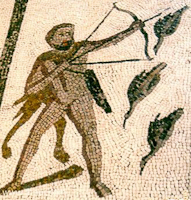| E-mail me at mcclainm@optonline.net | Visit my Facebook page | View my LinkedIn profile |

According to Diodorus of Sicily, Philoctetes got the bow from Heracles when Philoctetes agreed to light Heracles' funeral pyre:
Now when Iolaüs had carried out these orders and had withdrawn to a distance to see what would take place, Heracles, having abandoned hope for himself, ascended the pyre and asked each one who came up to him too put torch to the pyre. And when no one had courage to obey him Philoctetes alone was prevailed upon; and he, having received in return for his compliance the gift of the bow and arrows of Heracles, lighted the pyre. And immediately lightning also fell from the heavens and the pyre was wholly consumed.1
The bow and its history are central to the plot of Sophocles' Philoctetes. Soon after they land on Lemnos, Odysseus explains to young Neoptolemus the importance of retrieving the bow—without it, Troy cannot be taken. A comrade later explains that Odysseus learned this from Helenus, the prophet son of Priam, whom Odysseus had captured.
Gradually won over by Neoptolemus' lying speech, Philoctetes grants Neoptolemus permission to touch the bow, then to hold it. When he goes into a swoon, he hands the bow over to his new friend, asking him to guard it for him. Then, consumed by pain, Philoctetes asks Neoptolemus to do for him what he had done for Heracles:
Boy, my good boy, take up this body of mine
and burn it on what they call the Lemnian fire.
I had the resolution once to do this for another,
the son of Zeus, and so obtained the arms that you now hold.2
Neoptolemus, of course, does not end Philoctetes' life. He waits through his sleep, repents his deception, and returns the bow to its owner, much to the chagrin of his captain, Odysseus.
As Neoptolemus and Philoctetes prepare to desert the Greek army for home, the spirit of Heracles intercedes, commanding them to return to Troy—Philoctetes to be healed and to kill Paris with his bow, and Neoptolemus to serve as his companion.
The spirit says that this will be the second time Troy falls to the bow and arrows of Heracles, but we must leave that tale to another time.
"1 Library of History (4.38,4) translated by C.H. Oldfather
2 Philoctetes 798, David Grene translation